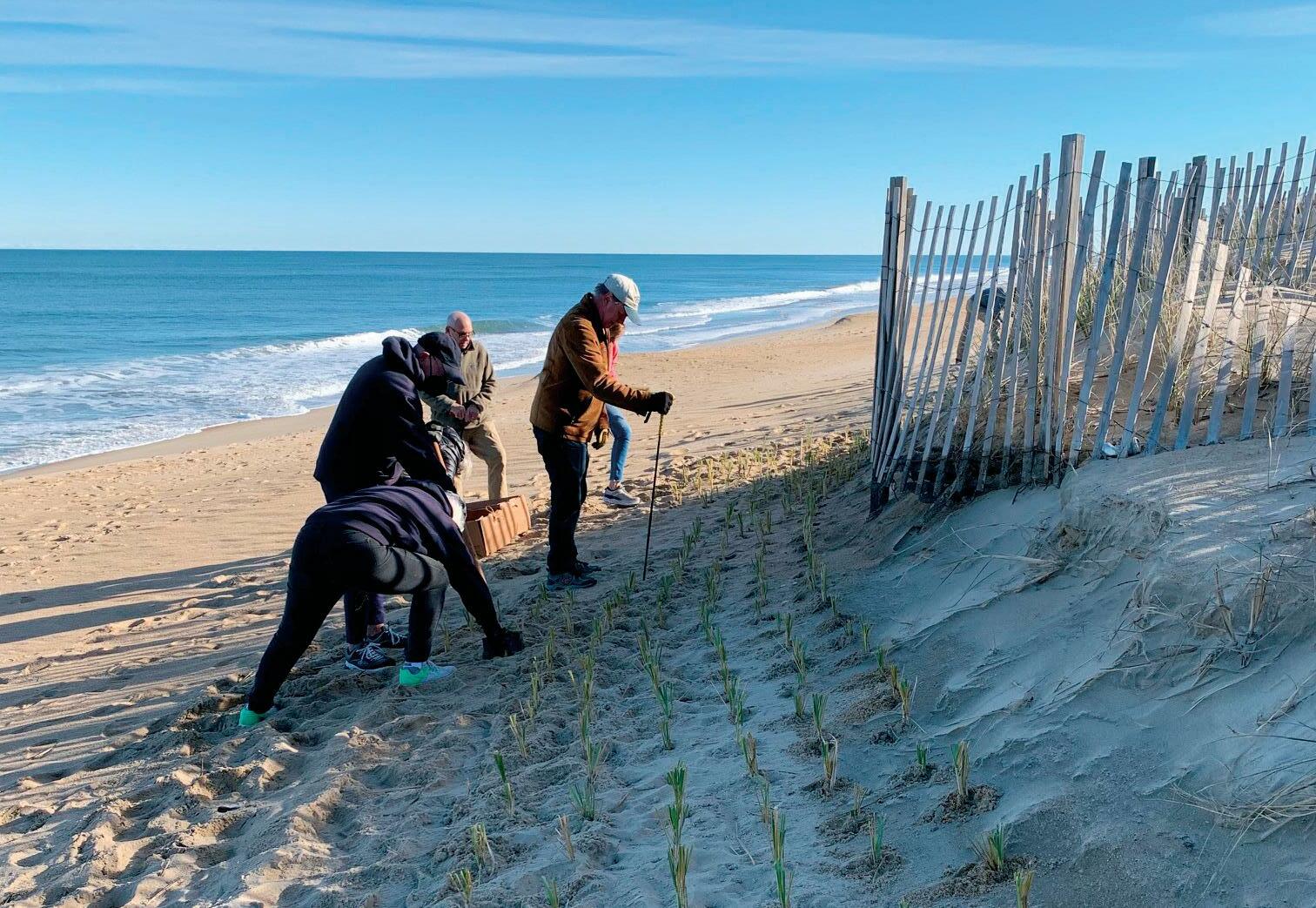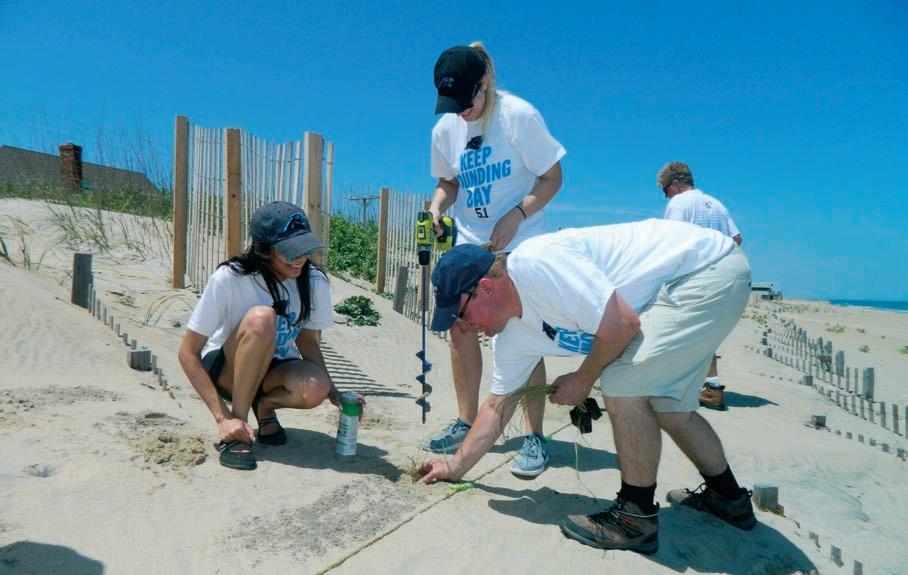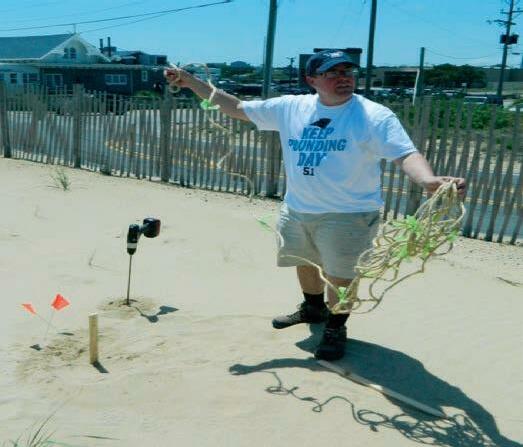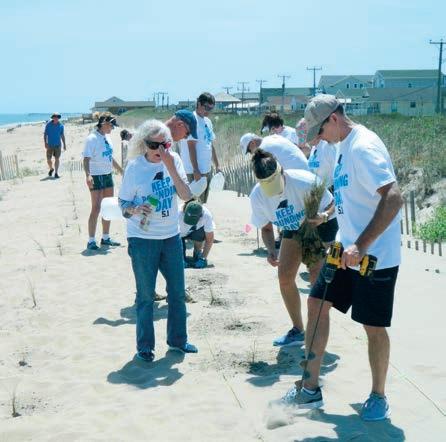
5 minute read
Saving the dunes
by Philip S. Ruckle Jr.
Although most people probably don’t give a lot of thought to grass, Donny King and Sandy Cross are two people here on the Outer Banks dedicated to grass.
Advertisement
That’s because each operates a program aimed at planting beach grass on the dunes all along the oceanfront.
While oceanfront dunes serve as a natural line of defense against storm surges by preventing or limiting coastal flooding, beach grasses help hold this natural barricade together and prevent some of the sand from being washed out into the ocean.
When Nags Head lost some of its dune line following a major storm, Donny King decided to do something about it.
Intent on making a difference, King formed a group of volunteers named Better Beaches OBX. Starting with a small group, his stable of volunteers now numbers around 250.
“We wanted to help create a more sustainable future for our area which locals and visitors can all enjoy,” said King. “We knew we could work with nature and make a difference.”
Working in various different beach areas, King said in addition to beach grass, his group plants sea oats at different times of the year. Christmas trees discarded after the holiday season can be used on the dunes as well.
“Beach grass goes in from November to February,” he explained. “Sea oats are best planted between Easter and Memorial Day, and Christmas trees that act as sand fencing go in between New Years and Valentine’s Day.”
King went on to say the beach grass comes from Drake Farms in Pinetops and sea oats from a native nursery in Florida called Earth Balance.
“The Christmas trees come from all over the community,” he added, “and a pizza place in Virginia brings us a crazy amount every year.”
According to King, his group does about 50 plantings a year in sessions running about an hour to hour and a half. Beach grass is planted between noon and 3 p.m. to take advantage of the warm weather and sun while sea oats are usually a little earlier in the day.
“We did have one day when we did a mile long area with the Carolina Panthers,” King continued. “We worked longer and it was sunny and hot in the 80s. That was a brutal day.
Coordinating a similar program in Duck, Sandy Cross uses volunteers along with paid contractors.
“We’ve been planting beach grass in the entire town of Duck for about 10 years,” offered Cross. “When we had our beach nourishment in 2017 we knew we had our paid contractors lined up, but we also knew that was probably not going to be enough in the nourishment area. The town manager at the time basically said in a field of dreams type comment, ‘if you can get the volunteers I can get you the grass.’ So I got the volunteers.”
Cross said her program was so successful in terms of volunteer hours and the number of volunteers that Duck’s Town Council was just overwhelmed with excitement.
“We had somewhere close to 250 different people come out,” said Cross. “Council was also excited at the potential to involve the community and visitors and non-resident property owners.”


Town of Duck photo
Volunteers in Duck work together planting beach grass in an e ort to stabilize an oceanfront dune helping it weather storms better.

“That first year we basically winged it, not really knowing exactly what we were doing,” Cross continued. “But with guidance from Donny King we were able to get most of the entire 7,500 linear feet of beach nourishment area in Duck planted with a 20-foot wide stretch.
Cross always starts the planting season on Veterans Day, November 11, with sessions running 60 to 75 minutes.
“So you could literally take a lunch break and get some grass planted,” she added. “I actually have some people doing that.”
Although volunteer numbers are down, Cross said her groups are still getting close to the same amount of plants into the ground with about 20 events each year.
“It does wonderful things for the dune,” Cross added. “Grass is our first line of defense. It’s our sacrificial base and very inexpensive to put in the ground with volunteers and much less expensive than sand fencing because there’s no maintenance involved, so to speak, with the grass. With sand fencing, a storm can cause damage that has to be repaired. You have to take it out and cut it out, but with these plants they just grow and do their own thing.”
Because not all of Duck beaches can be covered by volunteers, Cross still utilizes paid contractors along with her volunteers. She schedules volunteers in one area and paid contractors in another.
Cross said she is also looking at other planting options. Her crews currently plant three different species now, and she’s looking at a possible fourth to that mix.
“Beach grass is just one of maybe six that are ideal for the dune system depending on where you are in the geographic heat zone,” she said.
And, while the dune system benefits from multiple plantings, Cross said there is a benefit for volunteers as well.
“Beach grass planting is one fantastic way to get involved in your community,” she added. “You can meet new people and do something good for the environment.”




Philip S. Ruckle Jr. fi le photo
Carolina Panthers representatives Khevna Desai, left, and Kelly Ballance came in from Charlotte on May 1, 2019 to help Donny King and his Better Beaches OBX organization plant sea oats on the dune line in Kitty Hawk. The endeavor was part of the Panthers’ “Keep Pounding Day” and, along with other volunteers in ten groups, planted about 6,000 sea oats.

Philip S. Ruckle Jr. fi le photo
Donny King prepares to lay out a line during a May 2019 Better Beaches OBX sea oats planting session in Kitty Hawk. Sea oats on the dune line help stabilize a dune, enabling it to weather storms better, and the line helps volunteers plant more e ciently.

Philip S. Ruckle Jr. fi le photo
Volunteers from Duck and Kitty Hawk work together as one of 10 groups planting sea oats on the dune line during a May 2019 Kitty Hawk planting session. Sea oats planting is a proven method to help stabilize a dune to better weather storms.










